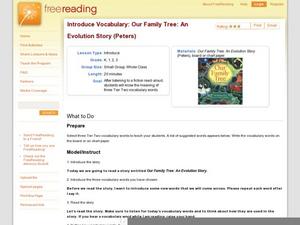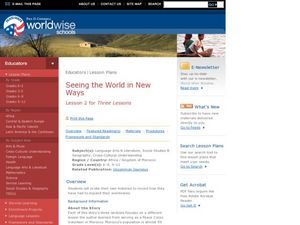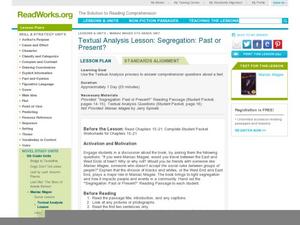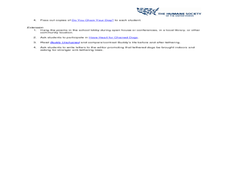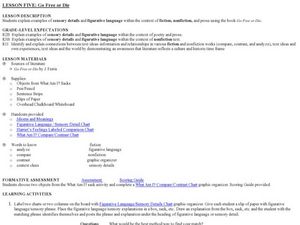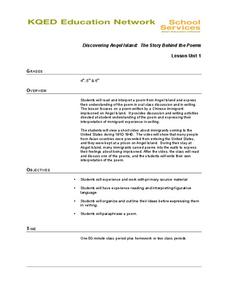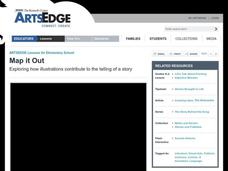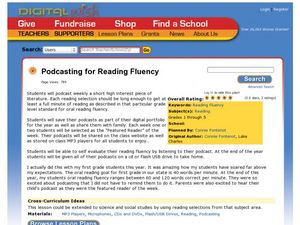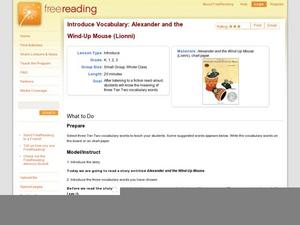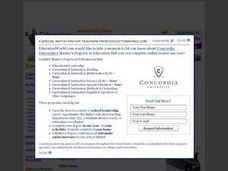Curated OER
Introduce Vocabulary: Our Family Tree: An Evolution Story (Peters)
Lisa Peters presents macroevolution as a large-scale family tree in her book Our Family Tree: An Evolution Story. She suggests the process from single-celled organisms to modern-day humans, and learners explore new vocabulary through the...
Curated OER
Kumeyaay Indians
Useful for literary analysis, citing textual evidence, or summary skills, this lesson about the Kumeyaay Indians would be a good addition to your language arts class. Middle schoolers read novels and summarize the literature in their own...
Curated OER
Round-Robin Reading Quiz
Small groups of learners read text round-robin style, and then work individually to answer three questions based on the text. Next, they share their questions and responses and add ideas from the group. The reading strategies detailed...
Curated OER
Seeing the World in New Ways
Learners examine their own history to expand how they examine the world. They research being a Peace Corps volunteer in Morocco. They also examine Muslim culture.
Curated OER
Textual Analysis Lesson: Segregation: Past or Present?
Are your scholars reading Jerry Spinelli's Maniac Magee? If so, use this textual analysis packet and lesson guide to drive deeper thinking about the characters, create personal connections, and apply historical contexts to the text....
Curated OER
Poetic Justice: Understanding the Life of a Tethered Dog
The Humane Society provides a lesson in which class members explore the issue of tethering dogs. Through the resources used -- a comic, a poem, and narrative and expository writings -- class members realize that messages can be conveyed...
Curated OER
Lesson 3: Idioms
You're as cute as a bug. But are you really as cute as a bug? Bugs aren't cute! Idioms are fun nonliteral phrases that mean something different than the words they contain. Second graders learn about idioms as they read the book, More...
Curated OER
Go Free or Die: Figurative Language
Figures of speech, sensory details, and academic language are all targeted while reading Chapter Two of J. Ferris’ Go Free or Die. First, learners engage in an exercise to practice describing with detail. Then, partners use a chart to...
Curated OER
Theater: Create a Script
Figurative language is the focus in the book Teach Us, Amelia Bedelia. After reading Peggy Parish's book, class members dramatize idioms from the text, using dramatic strategies such as characterization, exaggeration, and improvisation....
Curated OER
Go Free or Die
Groups of older elementary learners begin their study of figurative language by visiting a website and completing the exercises detailed there. They then apply what they have learned by finding examples in several poems. Finally, they...
Curated OER
Discovering Angel Island: The Story Behind the Poems
Poems carved into the wooden walls of the Asian immigrant prisons on Angel Island provide upper elementary graders an opportunity to study not only the story behind the poems but to also focus on the figurative language employed by the...
Curated OER
Map It Out
Explore how illustrations add to a story. Young learners will look at picture books to see how the pictures tell the story. They create illustrations to go with a chosen story, and then flip the activity so they have to write a story to...
Curated OER
Introduce Vocabulary: Are Trees Alive? (Miller)
Explore the life inside trees as scholars learn vocabulary through Debbie Miller's informational text Are Trees Alive? Familiarize pupils with the new words they will hear like anchor, disease, awaken, harsh, and swell before reading....
Curated OER
Podcasting for Reading Fluency
Nothing helps you identify your reading fluency like hearing yourself read aloud! Increase reading fluency and expression by having young learners podcast a weekly high interest piece of literature. Assign a different star or featured...
Curated OER
Introduce Vocabulary: Hot Air: The (Mostly) True Story of the First Hot-Air Balloon Ride (Priceman)
What a fun way to explore new vocabulary words! Marjorie Priceman's book Hot Air: The (Mostly) True Story of the First Hot-Air Balloon Ride offers plenty of new words for scholars to learn in context: amateur, assembled, demonstration,...
Curated OER
Introduce Vocabulary: Have You Seen Bugs? (Oppenheim)
Are your scholars interested in bugs? Get future entomologists excited about vocabulary through Joanne Oppenheim's colorful book Have You Seen Bugs? They use the informational text (although this strategy is useful for any book) to learn...
Curated OER
Introduce Vocabulary: Happy Birthday, Moon (Asch)
Can you wish the moon a happy birthday? Beginning readers contemplate this as they listen to Frank Asch's book Happy Birthday, Moon, the context for a vocabulary study. There are three words outlined here: chat, echo, and perfectly, but...
Curated OER
Introduce Vocabulary: Everybody Cooks Rice (Dooley)
Use Norah Dooley's culturally inspiring book Everybody Cooks Rice to explore delicious new vocabulary in context with beginning readers. The recommended words here are: delicious, grumbling, and gulp; pre-teach them before reading the...
Curated OER
Introduce Vocabulary: Black Bear Cub (Lind)
Kids love reading stories! There are many opportunities to learn new words in context as budding readers listen to Alan Lind's story Black Bear Cub. They focus on seven nature-related vocabulary terms: cub, den, forage, lure, scarce,...
Curated OER
Introduce vocabulary: Alexander and the Wind-Up Mouse (Lionni)
Provide access to new vocabulary words (envy and mysteriously) in context as emerging readers listen to Leo Lionni's Alexander and the Wind-Up Mouse. Explain these terms before reading the story aloud and help kids utilize context clues...
Curated OER
Introduce Vocabulary: A Day at the Apple Orchard (Faulkner and Krawsky)
If your class is reading A Day at the Apple Orchard by Megan Faulkner, be sure to use this guide for vocabulary in context. Go over the orchard-related terms (cycle, harvest, orchard, pollen, and ripen) before reading the story aloud....
Curated OER
Introduce Vocabulary: Jonathan and His Mommy (Smalls)
Go on a walking adventure through Irene Smalls' touching book Jonathan and His Mommy, an excellent resource to practice vocabulary in context. Go over the walking-themed terms (humongous, pace, leap, and zigzag) learners will hear before...
Curated OER
Walk in My Shoes: A Shoe's Perspective
Help learners write a creative story from the viewpoint of a shoe. The teacher brings a variety of different types of shoes to the classroom and each person chooses one. They then write a story from the point of view of the shoe,...
Curated OER
Reintroduce: Main Idea
What would a main idea be without important details? Readers use a graphic organizer to record key details from an informational text (a fiction text would also work). Review main idea as a concept before beginning, asking scholars to...


